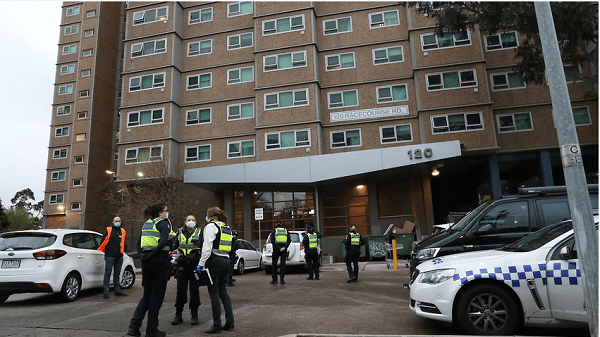On Saturday afternoon, Victoria’s Premier Daniel Andrews swiftly enforced a hard lockdown on residents of the Flemington public housing estate in Melbourne’s inner north west. The call was made after at least 27 cases of Coronavirus were identified in more than 12 households within the community.
Nine towers comprise the estate, housing more than 3000 of the city’s most vulnerable. This includes single mothers, refugees, the elderly, people with disabilities and individuals struggling with mental health issues. The lockdown order was signalled for fourteen days with a minimum mandatory five days for all residents.
Soon after the decision was made by Victoria’s state government, around 500 armed police were dispatched to the estate to ensure residents could not leave. While some members of the community felt relieved that immediate measures to eliminate the virus had been implemented, others described feeling “ambushed” by the decision and confused by the government’s poor communication. Some of those living within the estate returned home that day, only to be informed that they would not be leaving again. Resident Hiba Shanino told The Guardian: “Some single mothers who don’t speak much English were asking ‘Why are they here? What have we done wrong?’”
On top of this, trapped residents shared serious concerns that support services like language interpreters, culturally appropriate food and other products like baby formula were not delivered to the site in adequate time over the weekend.
Community leaders of the estate reported that for weeks they had tried to get problems addressed which would curb the spread of the virus. Measures they had suggested included ready access to hand sanitiser, deeper cleaning of shared spaces and having a broken lift fixed to ensure residents weren’t all using the same lift up to their apartments.
Community advocate and resident of the estate Ahmed Dini, told ABC Breakfast News this morning, that while the virus’ explosive spread had been diabolical, numerous other challenges existed for residents in lockdown including the increased risk of mental health deterioration as well as potential cases of domestic and family violence; with women being especially vulnerable.
Emma King from the Victorian Council of Social Services shared this sentiment and suggested that the immediate use of police had offset a feeling of uneasiness and fear among residents– many of whom have been traumatised and hold distrust toward law enforcement.
“It feels pretty stark. It feels like we’re in this delicate, very precarious situation,” she said. “I guess what I’m really mindful of now is that people on the estate know what’s going on, that they’re properly supported. Obviously you would expect that ideally this would have been led by health professionals; by doctors, by nurses and community leaders who would be able to talk with the community. I think it’s a huge challenge with having police arrive on site with no notice.”
She also underlined that those living within the community had not been acting recklessly and the spread of the COVID had been inevitable.
“There’s a very delicate balancing act here between saving lives and having the briefing from the Deputy Health Officer and the Chief Health Officer yesterday which was very clear around the issues that exist in this particular estate at the moment because of high density,” she said. “No one’s done anything wrong. People are simply living in high density buildings in often very cramped conditions and socialising with each other—it’s created this extraordinary crisis.”
For residents in the towers who may need support:
Housing Call Centre: 1800 961 054
DHHD Coronavirsus hotline: 1800 675 398

